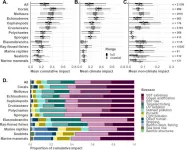(Press-News.org) A clinical trial supported by the National Institutes of Health (NIH) was stopped early after researchers found sufficient evidence that a drug used to treat bone marrow cancer and Kaposi sarcoma is safe and effective in treating hereditary hemorrhagic telangiectasia (HHT), a rare bleeding disorder that affects 1 in 5,000 people worldwide. The trial results, which are published in the New England Journal of Medicine, detail how patients with HHT given the drug, called pomalidomide, experienced a significant reduction in the severity of nosebleeds, needed fewer of the blood transfusions and iron infusions that HHT often demands, and showed improved quality of life.
“Finding a therapeutic agent that works in a rare disorder is highly uncommon, so this is a real success story,” said Andrei Kindzelski, M.D., Ph.D., of NIH’s National Heart, Lung, and Blood Institute. “Before our trial, there was no reliable therapeutic to treat people with HHT. This discovery will give people who suffer with this disease a positive outlook and better quality of life.”
HHT, also known as Osler-Weber-Rendu Syndrome, is characterized by serious defects in the way the body’s blood vessels form. Instead of growing linearly, they become unusually tangled and twisted. The disordered blood vessels are fragile and prone to leaking, which causes excessive nosebleeds or bleeding along the gastrointestinal tract and other mucosal surfaces. These bleeding episodes, which worsen with age, can result in anemia and reduced quality of life. In severe cases, they can be life-threatening.
Current options to treat HHT involve closing off the malformed blood vessels in the nose and gastrointestinal tract or prescribing off-label medications that temporarily stabilize blood clotting at sites of bleeding vessels, which in turn reduces bleeding. There are currently no Food and Drug Administration-approved medications for long-term management of HHT.
Researchers speculated that pomalidomide worked by blocking the growth of abnormal blood vessels. It may cause the blood vessels to have a more normal structure or thicker walls so they are less fragile. However, the research team, led by Keith McCrae, M.D., professor of molecular medicine at the Cleveland Clinic, says further study will be needed.
Researchers enrolled 144 adults with HHT at 11 U.S. medical centers between Nov. 5, 2019, and June 27, 2023. All participants had moderate to severe nosebleeds requiring iron infusions or blood transfusions. Researchers gave 95 of the participants 4 mg of pomalidomide daily, though the dosage was reduced to 3 mg or 2 mg daily in patients with adverse reactions – mostly constipation, rashes, and lower than average white blood cell counts. The remaining 49 patients received a daily sugar pill designed to look exactly like the pomalidomide pill, in addition to their usual care.
At the start of the trial, researchers used a validated HHT-specific bleeding assessment tool to score each patient’s nosebleed severity. To establish a baseline in other areas, participants self-reported other data throughout the trial, particularly the severity of their nosebleeds and the effect of their HHT symptoms on everyday activities using a special scoring system. The number of units of red blood cells transfused or iron infused was also recorded.
In June 2023, 43 months into the scheduled four-year trial, an interim analysis found pomalidomide had met a prespecified threshold for efficacy, and the trial was closed to further enrollment.
“These findings have broader implications for people with more severe forms of HHT,” said Kindzelski. “In those cases, malformed blood vessels can develop in organs such as the lung, liver, and brain, which can lead to hemorrhagic stroke, bleeding in the lungs, or heart failure. A treatment like this could be lifesaving for such patients.”
Though researchers did not follow participants after the trial ended, McCrae noted that some of his patients from the study have gone four to six months without a recurrence of nosebleeds, even though they had stopped the medication. This suggests that the drug may have promise as a long-term or intermittent treatment.
Study: Al-Samkari H, Kasthuri R, Iyer VN, et al. Pomalidomide for Epistaxis in Hereditary Hemorrhagic Telangiectasia. New England Journal of Medicine. 2024. doi: 10.1056/NEJMoa2312749
Funding: This study was supported by NHLBI grants: 1U24HL140090-01A1; 1UG3HL140097-01A1. This trial is registered with Clinicaltrials.gov: NCT03910244.
# # #
About the National Heart, Lung, and Blood Institute (NHLBI): NHLBI is the global leader in conducting and supporting research in heart, lung, and blood diseases and sleep disorders that advances scientific knowledge, improves public health, and saves lives. For more information, visit www.nhlbi.nih.gov.
About the National Institutes of Health (NIH): NIH, the nation's medical research agency, includes 27 Institutes and Centers and is a component of the U.S. Department of Health and Human Services. NIH is the primary federal agency conducting and supporting basic, clinical, and translational medical research, and is investigating the causes, treatments, and cures for both common and rare diseases. For more information about NIH and its programs, visit www.nih.gov.
END
A drug approved for treating the blood cancer multiple myeloma may offer a safe and effective way to reduce the risk of severe nosebleeds from a rare but devastating bleeding disorder. Hereditary hemorrhagic telangiectasia (HHT), the world's second-most-common inherited bleeding disorder, affects approximately 1-in-5,000 people and can have life-threatening complications, but there are currently no U.S. FDA-approved drugs to treat HHT. The PATH-HHT study, the first-ever randomized, placebo-controlled ...
Associate professor of chemical engineering Bryan Berger received funding from the Environmental Protection Agency to reduce the impact of per- and polyfluoroalkyl substances, known as PFAS, in food and farming communities.
The award is part of the over $15 million the EPA granted to 10 institutions for PFAS reduction research, aimed at improving farm viability and increasing knowledge of PFAS accumulation.
Water sample collection for testing in Limestone, Maine. (Contributed photo)
Known as forever chemicals, PFAS are man-made substances that have been used in industry ...
Superintelligence — AI systems that surpass human intelligence — could be just a decade away, raising urgent questions about how to ensure their safety and alignment with human values, according to OpenAI.
These AI systems could be hugely beneficial, but more sophisticated systems create the possibility for unpredictability. Misinterpreting human values or intent, algorithmic biases and security risks are all cause for concern, especially with highly developed AI systems where the potential consequences are far greater.
Yu Meng, assistant professor of computer science at ...
WASHINGTON, D.C.—A new website, AnimalMethodsBias.org, created by the Coalition to Illuminate and Address Animal Methods Bias (COLAAB), provides researchers guidance and resources aimed at helping them successfully publish nonanimal biomedical research by overcoming the preference some peer reviewers have for animal-based research methods.
“We recently found that half of researchers surveyed had been asked by reviewers to add an animal experiment to their otherwise animal-free study,” says Catharine ...
MINNEAPOLIS – People whose diet more closely resembles the MIND diet may have a lower risk of cognitive impairment, according to a study published in the September 18, 2024, online issue of Neurology®, the medical journal of the American Academy of Neurology. Results were similar for Black and white participants. These results do not prove that the MIND diet prevents cognitive impairment, they only show an association.
The MIND diet is a combination of the Mediterranean and DASH diets. It includes green leafy vegetables like spinach, ...
MINNEAPOLIS – A class of drugs for diabetes may be associated with a lower risk of dementia and Parkinson’s disease, according to a study published in the September 18, 2024, online issue of Neurology®, the medical journal of the American Academy of Neurology.
The study looked at sodium-glucose cotransporter-2 (SGLT2) inhibitors, which are also known as gliflozins. They lower blood sugar by causing the kidneys to remove sugar from the body through urine.
“We know that these neurodegenerative diseases like dementia and Parkinson’s disease are common and the number of cases is growing as the ...
SECORE International’s Coral Seeding approach utilizes assisted reproduction, the breeding of corals, for reef restoration. This approach is realized within a training and partner network throughout the Caribbean. Now, a peer-reviewed study shows that all the effort was worthwhile: during the devastating heatwave in the Caribbean in 2023, the young, bred corals out on the reef stayed healthy while most of the remaining wild corals bleached and many died in the aftermath.
The summer of 2023 was deadly for many corals in the Caribbean Basin. An unprecedented heatwave, in intensity as well as in duration, hit the Caribbean with catastrophic ...
A mysterious tusked animal depicted in South African rock art might portray an ancient species preserved as fossils in the same region, according to a study published September 18, 2024 in the open-access journal PLOS ONE by Julien Benoit of the University of the Witwatersrand, Johannesburg, South Africa.
The Horned Serpent panel is a section of rock wall featuring artwork of animals and other cultural elements associated with the San people of South Africa, originally painted between 1821 and 1835. Among the painted figures is ...
Climate change and a range of other human impacts are putting marine animals at risk of extinction – even those living in almost pristine marine habitats and diverse coastal regions – reports a new study by Casey O'Hara of the National Center for Ecological Analysis and Synthesis at the University of California, Santa Barbara, USA, and colleagues, published September 18, 2024 in the open-access journal PLOS ONE.
Human activities on land and sea, in combination with climate change, are degrading coastal ...
Stuttgart – Scientists at the Max-Planck-Institute for Intelligent Systems (MPI-IS) have developed hexagon-shaped robotic components, called modules, that can be snapped together LEGO-style into high-speed robots that can be rearranged for different capabilities. The team of researchers from the Robotic Materials Department at MPI-IS, led by Christoph Keplinger, integrated artificial muscles into hexagonal exoskeletons that are embedded with magnets, allowing for quick mechanical and electrical connections. The team’s work, “Hexagonal electrohydraulic modules for rapidly reconfigurable high-speed robots” will be published in Science ...





